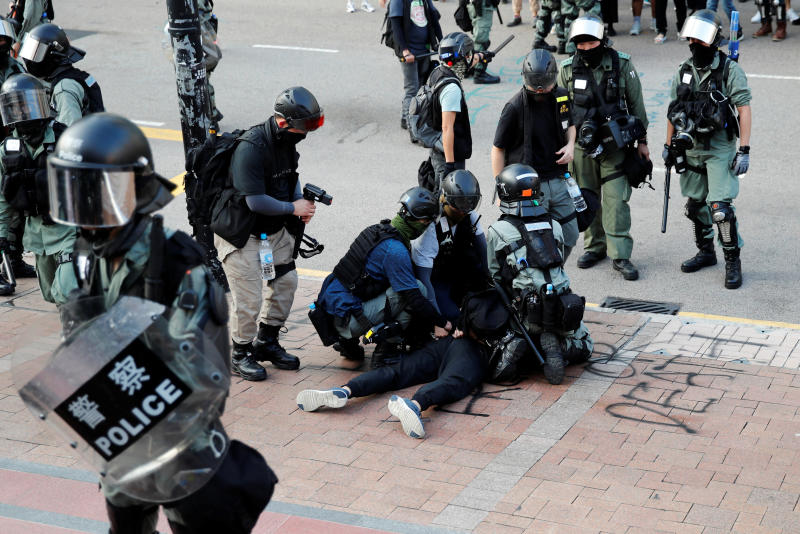Hong Kong police fire tear gas to disperse protesters rallying against alleged police brutality
Sign up now: Get insights on Asia's fast-moving developments
HONG KONG - Hong Kong police fired tear gas and pepper spray on Sunday (Oct 27) to disperse demonstrators who gathered at the city's Tsim Sha Tsui shopping district in Kowloon to protest against alleged police brutality following months of unrest.
Hundreds dressed mainly in black tops gathered in Salisbury Garden near the Kowloon harbourfront, many donning the now-banned face masks, as they shouted slogans such as "disband the police force" and "fight for freedom, stand with Hong Kong".
Police had earlier warned protesters to leave the district, placing cordons and blocking traffic on Nathan Road, Kowloon's main thoroughfare.
As the crowds spilled over onto the nearby Nathan and Salisbury Roads, riot police turned up to disperse the protesters, making several arrests.
They later charged at the crowd to arrest a protester, prompting the others to surround the group of officers. The police responded by firing pepper spray and tear gas onto the crowd, catching many by surprise.
An injured man was taken away on a stretcher to an ambulance, Reuters news agency reported.
Many of the protesters dispersed after the tear gas and pepper spray were fired, with protesters later regrouping in Mong Kok, where they defaced the subway entrances in the area.
Sunday's rally, the 21st consecutive weekend of the anti-government protests, is seen as a litmus test of how deep the anger against the force, once touted as Asia's finest, runs among the pro-democracy protesters.
The protests were sparked by Chief Executive Carrie Lam's unsuccessful attempt to introduce a new extradition Bill, which would have allowed for the handover of fugitives to several jurisdictions, including mainland China.

While the legislation has since been withdrawn, the move had raised fears about the city's relative freedoms, drawing millions onto the streets in protests, some of which have spiralled into violence.
In the past five months, clashes have frequently broken out between police and demonstrators, with frontline protesters throwing bricks and petrol bombs at officers as well as setting up roadblocks with debris and metal barricades to slow officers down.
In response, the officers have retaliated with tear gas, bean bag rounds, rubber bullets and pepper spray. Real bullets have also been fired on some occasions when officers were under siege, authorities have said.
The police have rejected the protesters' accusations of brutality and excessive use of force, saying they have shown restraint even in situations when their lives were in danger.
Standing as protesters around him chanted slogans, business analyst William Lam, 40, told The Straits Times he believed the police force should be reorganised in phases.
Mr Lam said there had been cases where the police used weapons to beat and kick protesters who they arrested, adding that the police did not "understand the law and their responsibilities."
"They just want us to calm down and say nothing against the government and police but we want the Hong Kong government to demand the police to reorganise or dismiss the whole unit and then reform them in a way that the policemen recruited are of very good standard," he said.
Protester George Chung told The Straits Times that he felt it was important to show support for the movement even if their appeal to the government went ignored.
"We need to take a stand against police brutality. I know people have said despite all these rallies, nothing is being done. It's difficult to go from zero to one, but we need to continue to show our support," he said.
The 32-year-old, who was not wearing a face mask like the many other protesters, said he felt no need to don one as he was simply voicing legitimate concerns. "I'm exercising my right as a citizen by not wearing a mask," he said.
The government has banned the use of face masks during mass gatherings since Oct 4, under a colonial-era emergency law, though the move has further agitated its opponents.
Protesters at the rally also called for the protection of "Muslims and journalists", in reference to an incident during protests last weekend, in which police sprayed water cannons tinted with blue dye outside a mosque at Nathan Road that hit some Muslim citizens and journalists.

Since June, some 2,700 people have been arrested with most out on bail. Some 200 of them face a maximum jail term of 10 years for rioting.
Ahead of Sunday's rallies, the city's train operator, a common target of protesters, said services on all lines will end at 10pm on Sunday, three hours earlier than normal, to facilitate maintenance and repair works.
MTR said the Airport Express will run as per normal until 2pm, when it will only stop at Hong Kong Station and Airport Station.
The measures followed Saturday night's (Oct 26) skirmishes between protesters and riot police in Yuen Long after a tense stand-off, where officers fired tear gas to disperse the crowd.
A large group of people had gathered along Castle Peak Road at about 8pm, responding to online calls to "take back" Yuen Long and chanted slogans against alleged police brutality, calling for the force to be disbanded.
Some hurled abuse at officers and set up barricades on the road.
In a statement late on Saturday night, the police said violent protesters near Tai Tong Road damaged traffic lights and blocked roads using minibus stop flags and traffic cones.
While the anti-government protests began in response to the contentious extradition Bill, they have since evolved into calls for greater democracy, among other demands.
The protests have also been laced with anti-China sentiments, with demonstrators shifting their anger to Beijing, who they say has been tightening its grip on the territory and eroding the territory's freedoms.


